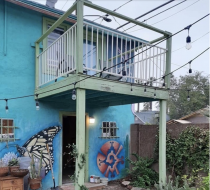With #FrontlineHouses, a Phoenix Nurse Is Connecting Hospital Workers With Housing Favorite
A 43-year-old ICU nurse, Jason Odhner is, as one might imagine, awfully busy these days. He works at several local hospitals, is the co-founder of a health-justice nonprofit called Phoenix Allies for Community Health, and he recently started an initiative called #FrontlineHouses, which is connecting health care workers with housing during the coronavirus pandemic.
Saving lives trumps answering questions from journalists, and Odhner wasn’t able to get back to us in time about #FrontlineHouses. Instead, we spoke to Diane D’Angelo, a former Phoenix resident who, inspired by Odhner’s work here, launched a similar initiative in Denver, where she works as a hospice chaplain.
“He’s just a very special man,” D’Angelo says of Odhner. They met while both were working with Occupy Phoenix, the 2008 movement opposing economic inequality. She was doing front-lines activism for the group; Odhner was a street medic. D’Angelo remembers Odhner opening the free health clinic in the Garfield neighborhood shortly after. She was reminded of his success with self-made health initiatives when she saw a recent Facebook post by Odhner, touting #FrontlineHouses.
At its core, #FrontlineHouses is a Facebook group that lets medical workers who are concerned about bringing the coronavirus home to their loved ones connect with community members who can offer short-term housing. This includes now-empty churches, private residences, and other repurposed facilities. Odhner was motivated to start the group by his experience working in West Africa during the Ebola epidemic. He knew he was putting his family at risk by coming home from work after a day spent treating intensive care patients with COVID-19.
“I was living with my wife and newborn son, plus my in-laws had moved in with us as well,” he wrote on the Facebook page he created on March 17 to promote the project. “Several members of the household are high risk, so I’m in the process of moving in with another ICU nurse to protect them.”
A few days later, he did. For the past week, Odhner has lived in the guest house of a duplex he owns, just a few doors down from the home he shares with his wife and month-old son. Separating himself from his family and posting about it on the #FrontlineHouses page may, he hopes, set an example for workers in a local health care system that needs every healthy medico it can find.
The response thus far has been evenly divided between health care workers eager to help their colleagues for the greater good, and laypeople looking to earn an extra buck by subdividing their rental properties.
“I have a house walking distance to HonorHealth Osborn,” one homeowner posted. “I’m not looking to make a profit … I would like to help the nurses and doctors have a place to stay.” Elsewhere on the page, an Airbnb client is offering her seven-bedroom home in Litchfield Park to nurses who can pay $400 a month (the maximum Odhner will allow a #FrontlineHouse to charge) for a bed and shared bath.
Meanwhile, in the few spare minutes he has outside the ICU, Odhner posts inspirational memes and rental and free housing opportunities for overworked, at-risk front-line health workers. He’s also created guidelines for the project.
“No dirty scrubs in the house, shower after every shift, wipe down all surfaces frequently,” is the first in a list of mandatory home-sharing rules Odhner posted on his Facebook page. “Treat each other like a family, check in with one another, support one another,” is another. “All residents agree to take their temperature daily and post it on the whiteboard.”
He’s keen on economic justice, too. “We will not tolerate disaster capitalism,” he says. “If front-line workers with different income levels live together, they should consider arranging for the CNA or EVS tech to pay less than the physician or RN.”
It’s a big commitment to voluntarily go into front-line housing, D’Angelo says. Often, family members aren’t supportive. “No one wants to be split up during a crisis. We’re not expected to reach an apex until mid-April, so people are putting off being distanced from their loved ones.”
Thus far, only Phoenix and Denver have launched official #FrontlineHouses programs, though D’Angelo says it’s inevitable that the idea will catch on. She thinks it’s likely there are other similar, less public, programs operating in other cities. (On March 30, Airbnb announced a partnership with multiple humanitarian agencies that will eventually provide housing for up to 100,000 COVID-19 relief workers.)
“We’re all making this up as we go along,” D’Angelo says. “It’s really something that Jason, who’s probably working around the clock taking care of the sick, even had the time to create this thing. Right now, any kind of support is a shot in the arm.”






